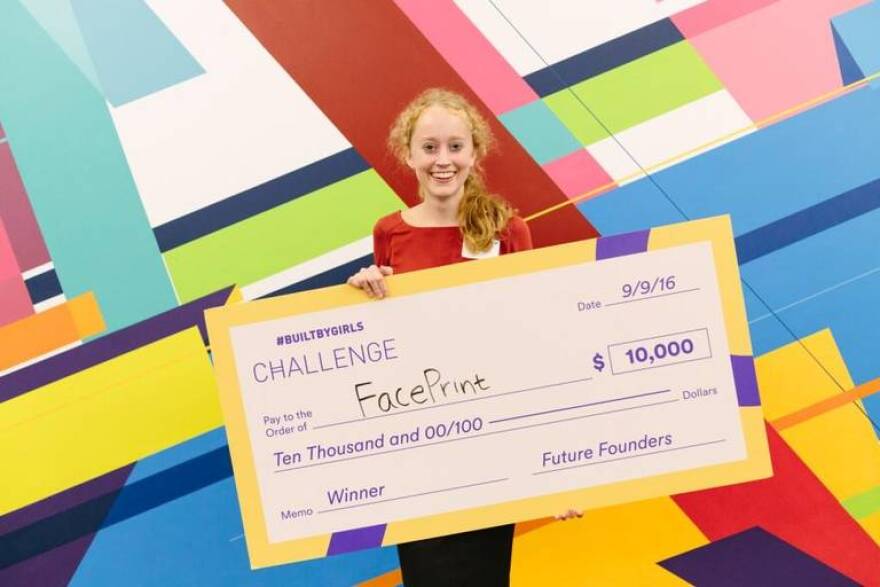Erin Smith doesn’t watch a lot of TV.
Instead, the 17-year-old spends her evenings perfecting an online tool she created. The tool, called FacePrint, can detect Parkinson’s disease years before current diagnosis methods by recording your facial reactions with a webcam at home.
Smith, a senior at Shawnee Mission West High School, has traveled to Twitter and Google headquarters, won a $10,000 prize from the #BuiltByGirls Future Founder competition to continue her research, and has been recognized by the Michael J. Fox Foundation.
FacePrint uses algorithms Smith developed to detect facial markers that might indicate the presence of Parkinson’s disease.
She spoke with Steve Kraske on a recent episode of KCUR’s Up to Date.
“I look at 33 different tracker points on the face, and they’re associated with distinct facial muscle movements,” Smith says. “Then I determine which of these individual muscle movements are different in Parkinson’s patients.”
To gather data, Smith has participants watch five Super Bowl ads, specifically selected to elicit certain spontaneous facial expressions. Then, to collect posed facial expressions, she also takes a photo of participants emulating three universal emojis. You can participate in the study here.

FacePrint is not yet available to the public, but the technology has already achieved 88 percent accuracy, comparable to current diagnostic methods. Smith says that more data and long-term studies could get her accuracy rate into the nineties.
According to the National Institutes of Health, about a half a million Americans suffer from Parkinson’s disease. Patients often experience progressive loss of motor control including tremors, slowness of movement, stiffness and trouble with balance. There is currently no cure for the disease.
Smith hopes FacePrint will allow diagnosis of the condition years earlier than through current methods. Smith says there’s often a gap between when Parkinson’s patients begin to experience symptoms and when they are diagnosed.
“If we can tap into this critical time period, then we’ll be able to test and develop novel therapeutics,” she says.
Early diagnosis can be key because some treatments are more effective when introduced sooner.
Smith’s idea evolved rapidly from humble beginnings as a science fair project into an internationally recognized technology.
“When I first had the idea about a year and a half ago, it started as solely a scientific endeavor,” Smith says. “I noticed that whenever Michael J. Fox or another Parkinson’s patient would laugh or smile, it came off as really emotionally distant or unfelt.”
She took those observations and paired them with inspiration from the TV show Lie to Me. The show’s protagonist, a body language scientist, uses the real-life Facial Acting Coding System to determine if people are lying. The system breaks down facial expressions into units.

She wondered if the same system could have health care implications.
Smith spoke with local caretakers and clinicians, who reported similar observations of distant and unfelt expressions in their Parkinson’s patients years before diagnosis. Then, she dove into research papers on the subject.
“I found that the part of the brain that Parkinson’s subjects experience changes in about five to ten years before diagnosis is the same section of the brain responsible for spontaneous facial expression formation,” Smith says.
She put all these pieces together to form her initial concept for FacePrint.
“As I started working with local Parkinson’s patients, it was that human element and those human interactions that propelled it forward, to where it is today,” Smith says.
Smith says a similar process could work in the future to identify other neurological and neurodegenerative disorders, such as PTSD, narcolepsy and supranuclear palsy.
“If [patients] experience changes in certain parts of the brain, then there should be external manifestations of those changes which are visible from their facial expressions,” Smith says. “I’m focusing on also quantifying those differences for the other diseases.”

Smith also sees potential to expand her research to social media platforms.
“It would be really amazing to turn Facebook, or ultimately Snapchat, into some sort of healthcare screening diagnostic tool,” Smith says.
When she’s not developing cutting edge technology, Smith advocates for teaching young girls how to code.
“When I first had this idea for the [FacePrint] project about a year and a half ago ... I’d actually never coded before,” Smith says. “That was a really intimidating thing for me to have this idea — I couldn’t stop thinking about it — I knew I had to make it a tangible reality but I didn’t know how.”
Smith’s solution was to check out coding books from the library, lock herself in her basement and teach herself how to code.
To help make the learning process easier for others, Smith founded KC STEMinists, a program that teaches middle and high school girls how to code.
“By the end of the program all the girls had developed an app idea in a small group,” she says. “It was really amazing.”
Smith says the class provides girls with the skill set and the confidence to pursue their own technological breakthroughs.
You can listen to Erin Smith's entire conversation with Steve Kraske here.
Marleah Campbell is an intern at KCUR's 'Up to Date.' You can reach her at marleahcampbell@gmail.com.



